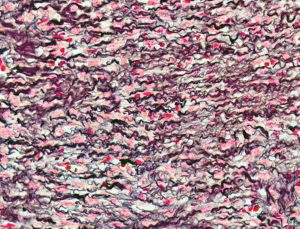Stromal Dynamics in Cancer Progression
 Immunotherapies have demonstrated remarkable efficacy as anti-tumor agents in some patients; however, it is unclear why the majority of patients are unresponsive to immune activation. Recent evidence suggests that immune cells can both promote and inhibit tumor progression depending on the signals received from the tumor microenvironment. The two prevalent cell types in the tumor stroma are immune cells and cancer-associated fibroblasts (CAFs). The percentage of CAFs increases during tumor progression and correlates with poor survival. There is compelling evidence that CAFs may interfere with the anti-tumor immune response by changing the landscape of immune cell infiltrates in tumors. CAFs secrete a dense extracellular matrix that traps immune cells, thus physically restricting their access to tumor islets. CAFs are also a rich source of biologically active molecules that attract or repel certain immune cell types. We are testing the hypotheses that the accumulation of CAFs during tumor progression skews the immune infiltrates toward the immunosuppressive profile and that this state can be reversed with CAF-targeted therapies. A systematic characterization of specific immune cell types that are affected by targeting CAFs may provide new approaches to enhancing immunotherapeutic efficacy and improving response rates in ovarian cancer patients.
Immunotherapies have demonstrated remarkable efficacy as anti-tumor agents in some patients; however, it is unclear why the majority of patients are unresponsive to immune activation. Recent evidence suggests that immune cells can both promote and inhibit tumor progression depending on the signals received from the tumor microenvironment. The two prevalent cell types in the tumor stroma are immune cells and cancer-associated fibroblasts (CAFs). The percentage of CAFs increases during tumor progression and correlates with poor survival. There is compelling evidence that CAFs may interfere with the anti-tumor immune response by changing the landscape of immune cell infiltrates in tumors. CAFs secrete a dense extracellular matrix that traps immune cells, thus physically restricting their access to tumor islets. CAFs are also a rich source of biologically active molecules that attract or repel certain immune cell types. We are testing the hypotheses that the accumulation of CAFs during tumor progression skews the immune infiltrates toward the immunosuppressive profile and that this state can be reversed with CAF-targeted therapies. A systematic characterization of specific immune cell types that are affected by targeting CAFs may provide new approaches to enhancing immunotherapeutic efficacy and improving response rates in ovarian cancer patients.